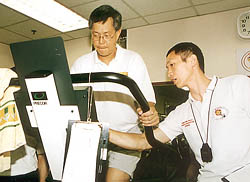



















| |
| With its surging population and fast changing economy
Hong Kong has seen rapid changes over the past 10 years-including a host of social problems
among which teenaged runaways is of particular concern. NTS Region is doing something
about it . . .
OUT of the 805 missing persons in New Territory South from January to June of this year, 442 were juveniles under the age of 18, with young girls making up 66 per cent and boys accounting for the rest. According to Woman Senior Inspector Betty Chan of the Regional Missing Persons Unit NTS, the problem is partly attributable to the large number of youths who have grown up in housing estates in the region's many new towns such as Tsing Yi and Ma On Shan. Many are from low income, dysfunctional families where both parents had to go out to work. Without regular parental guidance, many members of this new generation of neglected teenagers do poorly at school, are influenced by negative peer pressure and, attracted by the allure of Hong Kong's nightlife, are easily persuaded to run away from home. |
 WSIP Chan addressing the increasing number of child runaways |
|
"The peak season for runaways is during the summer school break, and during the holiday seasons of Christmas, Chinese New Year and Easter. Many also leave their homes in October after the school year resumes when they find that they cannot cope with school work," said WSIP Chan. "Most are from 12 to 16 years of age and are running away for the first time for not more than a few days. They loiter at convenience stores, piers, shopping centres and arcades during the day and sleep in parks at night or at a friend's home." Many start to commit petty crimes such as shop theft and assault, with some of the female runaways turning to prostitution, and the boys getting involved with triads. "RMPU NTS has adopted a series of measures to check this disturbing situation," said WSIP Chan. Police officers on patrol duty keep an eye out for suspected runaways and routinely sweep popular gathering places such as karaoke bars, billiard halls and games centres. "Runaways reported as missing are taken back to police stations and interviewed," said Ms Chan. "We ask why they left their homes, what they did during the period they were gone- and investigate whether they have been victimised or involved in illegal activities. First-time runaways are usually picked up by their parents and taken home. Habitual runaways are referred to social workers. Care and protection orders from the courts are increasingly applied for to compel these youngsters to accept counselling and monitoring by the Social Welfare Department. If needed, arrangements to send them to boarding schools and boys/girls homes are made." Moreover, DRC NTS Iain Nicholson presently chairs a bi-monthly Juvenile Crime Working Committee which aims at enhancing co-operation among police officers in dealing with the problem. The meeting is attended by representatives from RMPU, PCRO, RCPO and other formations in the region. Additionally, RMPU launched a joint operation with the Police Tactical Unit NTS in late August to carry out extensive sweeps of the region's gathering places for youths-at-risk in a bid to track down missing teenagers and to prevent them from committing crimes. But the police alone cannot combat the complex social problem of youngsters running away from home. Support from other organisations is essential. To this end, RMPU NTS has been organising seminars with representatives from the Social Welfare Department, the Student Guidance Section of Education Department as well as voluntary agencies like the Hong Kong Federation of Youth and the Hong Kong Boys & Girls Clubs Association. So far five seminars have been organised (including one initiated by the Kwai Tsing District Fight Crime Committee), and have been well-attended with positive response from participants. They are encouraged to exchange views and share experiences in dealing with youths-at-risk, and allow all involved to gain a better understanding of one another's working procedures and to develop co-operative strategies to combat the problem and provide comprehensive counselling to runaways and their families. Said WSIP Chan: "The seminars started in Kwai Tsing and Tsuen Wan last October on a trial basis, and with the help of local organisations we are planning to extend them to areas like Sha Tin and Lantau and to work out ways in tackling youth problems specific to the places concerned." She said: "The RMPU has also been actively following up on runaways, contacting school officials to see if they are attending classes on a regular basis and checking on their performance. We also arrange school talks to inform students of the dangers of running away from home and what they can expect if they commit a crime. We believe that with the help of all organisations involved we can begin the process of turning them around and re-integrate them back into a positive family life ? and into leading positive lifestyles." | |
| |
 SACP Dick Lee taking the "Challenge" during a lunch break |
SINCE its installation in April 1996, the Police
E-mail Network (PEN) has seen its users increase from 200 to around 1,600. General
Registries (GRs) in all Force formations as well as officers with PICS, FICS and RICS
systems are now connected to PEN. (Officers with the TOMS system will be connected to
PEN later this year).
Every day nearly 50,000 messages go out over PEN with a click of a mouse. |
|
SACP Dick Lee Ming-kwai tried out a rowing machine at the fitness centre in Arsenal House during a recent lunch break to show his support for Challenge Day, the 30-Minute Exercise Promotion Scheme organised by the Sports & Recreation Division of Personnel Services Branch. During the Challenge Day scores of visitors worked out at the three fitness stations set up for the challenge. Superintendent Sports & Recreation Mak Kwai-sing said the scheme was launched to tie in with the continuing Healthy Lifestyle Campaign aimed at encouraging Force members to spend their leisure time in meaningful activities conducive to a healthy life. "We also hope this programme, running from September to November, will help officers get into the habit of working out on a regular basis ? which should also enable them to pass the annual fitness test with ease," he said. Participants are given a registration card upon enrolling in the programme and get it chopped each time they work out for 30 minutes or more from now until the end of November. Souvenir caps, water bottles and towels are given once they accumulate 6, 9 and 12 chops in September, October and November respectively. Said SP Mak: "It is hoped that officers continue to keep fit long after they've completed the programme. Thirty minutes of regular, intense exercise at least three times a week (along with a proper diet) will help keep you fit for life. Planning is underway to introduce the 30-minute programme to regions throughout the Force." The fitness centre at PHQ (the largest facility of its kind in the Force), features 30 fitness training stations overseen by qualified instructors, and is open weekdays from 7:30am to 8:30pm, and from 9:30am to 5:30pm on Saturday. It is closed on Sunday and public holidays. In addition, a 30-minute comprehensive fitness evaluation service is available at the centre at a bargain price. For $50, officers (who fill out a lifestyle questionnaire) get a personal fitness profile including a detailed assessment of aerobic fitness, blood pressure, body fat and muscle flexibility, as well as advice on diet and a recommended exercise regimen. Appointments for the service can be arranged by phoning 2860-3415. Moreover, officers are invited to join the upcoming Fun Run along Bowen Road on Hong Kong Island in November. "But living a healthy lifestyle is more than just running, working out or playing sports," said SP Mak, referring to a recent family tree-planting day and the Police Arts Festival which are just two of the many activities embraced by the next phase of the Force's Healthy Lifestyle Campaign. The Police Welfare Fund has made available a grant of $500,000 for 98/99 which is open to application by all Force members and police organisations for activities and events in relation to the Healthy Lifestyle Campaign. Meanwhile, a poster design competition for the campaign has seen more than 80 entries with results to be announced soon. | |

